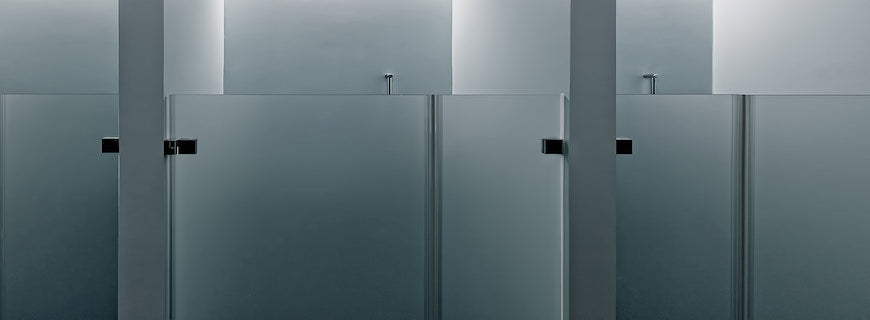Yes, it's true. There may be several reasons for this, and if you already suffer from skin conditions such as eczema, you will be far more sensitive to these.
Contributing factors include taking showers (or baths) that are too hot, causing the destruction of your natural skin oils. It could also be down to your shower water being either too acidic or too alkaline, so detergents and soaps don't dissolve and wash off properly.
If your water is hard, due to high levels of calcium and magnesium ions, it makes it too alkaline. Consequently, it can increase your skin alkalinity, causing damage to your skin barrier. In its weakened state, it becomes more sensitive to inflammation and irritation, and also more prone to infection.
A 2017 study found that the combination of a genetic predisposition and exposure to hard water may contribute to the development of eczema. Along with toxins in our water from medication, chemicals and heavy metals, another major skin irritant is chlorine.
What is chlorine?
Chlorine is a naturally occurring chemical element derived from salt. It is atomic number 17 on the periodic table and is a toxic yellow/green coloured gas.
It is a disinfectant that kills bacteria and is consequently used to sterilise our drinking water and swimming pools. It is also used in the manufacturing of a multitude of agriculture and consumer products, including paper, paints, textiles, water pipes, PVC, and insecticides.
The food industry also uses chlorine as an antibacterial; for example, it is used to clean fruits and vegetables and disinfect food contact surfaces.
It prevents the spread of waterborne diseases like cholera, typhoid, and dysentery. According to the DWI, the World Health Organisation set a maximum value of 5mg/l for chlorine, as a residual disinfectant in our drinking water.
DWI state that tap water in England and Wales is well below this guideline, with most water companies aiming to keep it under 1mg/l. You can look up minimum and maximum levels of residual chlorine in your drinking water here.
While it is at ‘safe’ levels in our water, in its raw gas form, chlorine is a harmful substance. Though you are hopefully never subjected to it in this form, most harmful chlorine exposure occurs by inhalation.
At low levels of exposure, it can cause eye and skin irritation, sore throat and a cough. At higher levels, it can lead to tightness of the chest, wheezing, narrowing of the airways, shortness of breath, and pulmonary oedema (fluid collection in the lungs).
How chlorine contributes to dry itchy skin, scalp & eczema
Researchers have linked exposure to residual chlorine in our tap water with the development or worsening of eczema.
When chlorine is added to our water, it goes through a series of processes as it reacts with nitrogen, organic material, metals, and other compounds. What’s left is free residual chlorine, which is available to disinfect the water.
In one study, researchers noted an increased sensitivity to residual chlorine in eczema patients. They also noticed that it reduced the water-holding capacity of the outermost layer of their skin, making it drier.
More studies are needed, but researchers have noted a correlation between higher water chlorine areas and eczema in children.
It’s also a well-known fact that chlorine dries out the skin, enough to make it sensitive. For some of us, even mild daily exposure from our bathing water can be enough to cause inflammation and irritation.
The link between chlorinated water, impaired gut health & skin conditions
Some recent studies have linked chlorine and other chemicals in our drinking water to the development of colorectal cancer. And while we are unsure of how chlorine may disrupt healthy gut bacteria, a 1987 animal study linked the consumption of monochloramine in drinking water to the downregulation of the immune system.
Chloroform is potentially carcinogenic and can form when showering in warm chlorinated water. Studies show that showering for just 10-minutes (with the opening of the pores, skin absorption and inhalation), can result in a higher chloroform intake than if you drank eight glasses of chlorinated water.
In-depth research is needed, but many believe that consistently drinking chlorinated water and inhaling chloroform while showering can destroy our intestinal flora. We know that at least 70% of our immune system stems from our gut microbiota. So one could suggest that in the animal study mentioned above, the monochloramine damaged the rats’ microbiota, leading to a weakened immune system.
Researchers have linked chlorinated tap water to increased food allergies. This again alludes to a potential link between chlorine in our household water and impaired gut microbiota.
We additionally know that there is a distinct link between impaired gut health and skin conditions such as eczema. So could chlorinated tap water also cause skin issues via the gut?
What's the solution?
Chlorine does prevent our exposure to harmful, life-threatening diseases, but there are concerns over potential health risks from ingesting or absorbing it, including skin problems.
However, if you effectively filter your water, you don’t have to subject yourself to it to such an extent.
If you are suffering from, and irritated by, any form of dry, itchy, skin or scalp, you could find that switching to a dechlorinating shower head revolutionises your life.
By removing chlorine from your shower water while also energising it, the Biocera Dechlorinating Shower Head could significantly improve your skin woes. It’s highly recommended if you suffer from conditions that can become aggravated when showering, such as rashes, sore eyes, dry, flaky skin, brittle hair, allergies or lung problems.
The stylish shower head is NSF certified and easy to fit onto any handheld shower. It even helps you save around 25% of water.
You could also try the Biocera Vitamin C Shower Filter to protect your skin from chlorine absorption.
The cherry-scented replaceable cartridge contains antibacterial bioceramic balls and vitamin C, creating a healthier shower experience. It’s easy to install and moisturises your skin, promoting relaxation and relieving tension.
When it comes to drinking water, we have a couple of options. The Energy Plus Water Filter is installed under your sink and provides high levels of water purification including the removal of chlorine and fluoride. This high-level contaminant removal combined with the benefits of natural bioceramic minerals gives you water that is filtered, alkaline, hydrogen-rich – and ALIVE.
The Biocera filter jug is cost-effective and easy to use. It removes chlorine and bacteria, and reduces heavy metals and dissolved organic residues such as benzene and pesticides.
The bioceramic minerals in the filter emit low levels of natural energy, improving water structure to provide great tasting, hydrogen-rich, life-giving water.
Conclusion
Chlorine can dry out your skin, and it’s not uncommon for people to feel itchy and inflamed after showering. It can be especially dehydrating if you have eczema, and some researchers have noticed an increase in atopic dermatitis of schoolchildren in areas with higher water chlorination.
There is also a potential link between chlorinated water and impaired gut health, and skin problems can often stem from, or be associated with compromised gut function.
By installing an efficient showerhead filter, you could eliminate a high percentage of your exposure to chlorine while showering, and may find that your skin symptoms improve.
Written by Rebecca Rychlik-Cunning, Nutritional Therapist and Homeopath. Follow Rebecca on Instagram, Facebook and Medium, @rebeccabitesback.
Water for Health Ltd began trading in 2007 with the goal of positively affecting the lives of many. We still retain that mission because we believe that proper hydration and nutrition can make a massive difference to people’s health and quality of life. Click here to find out more.




























Leave a comment